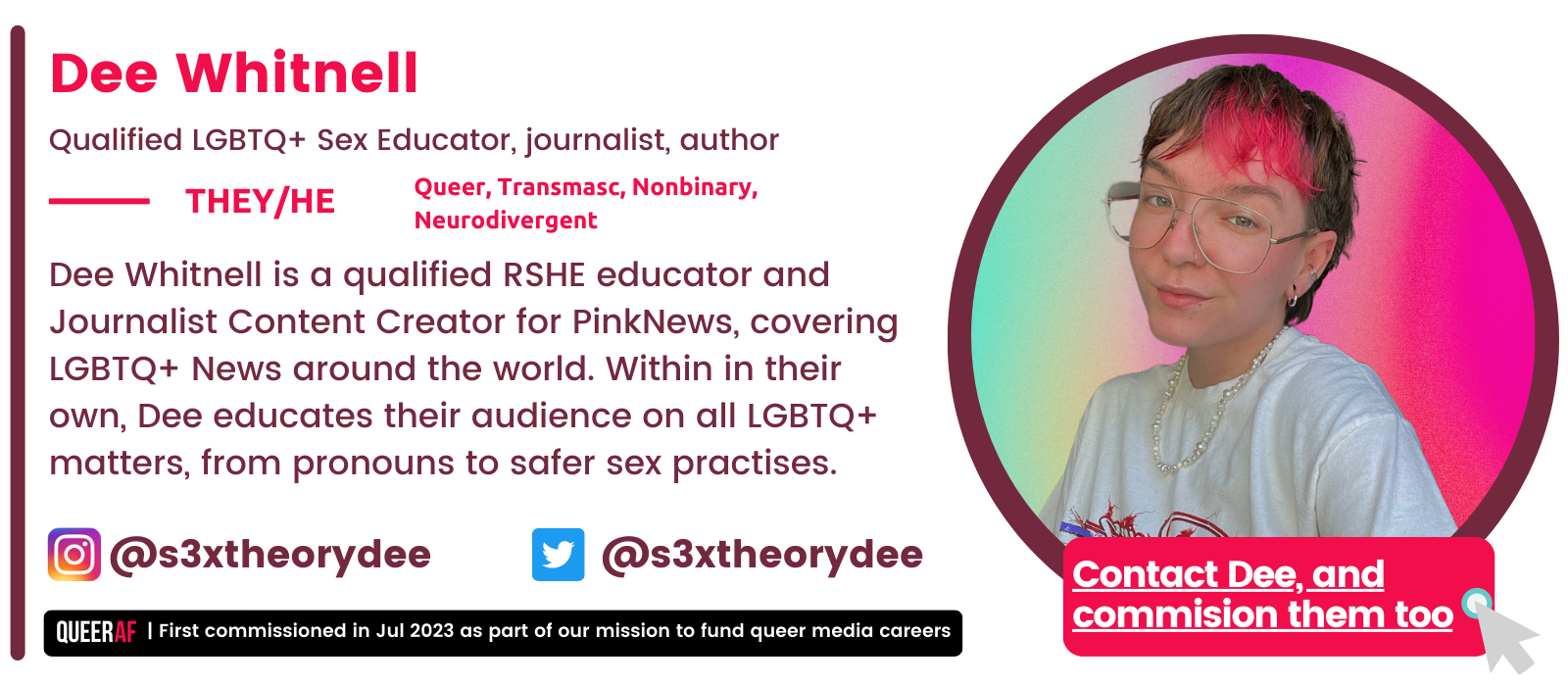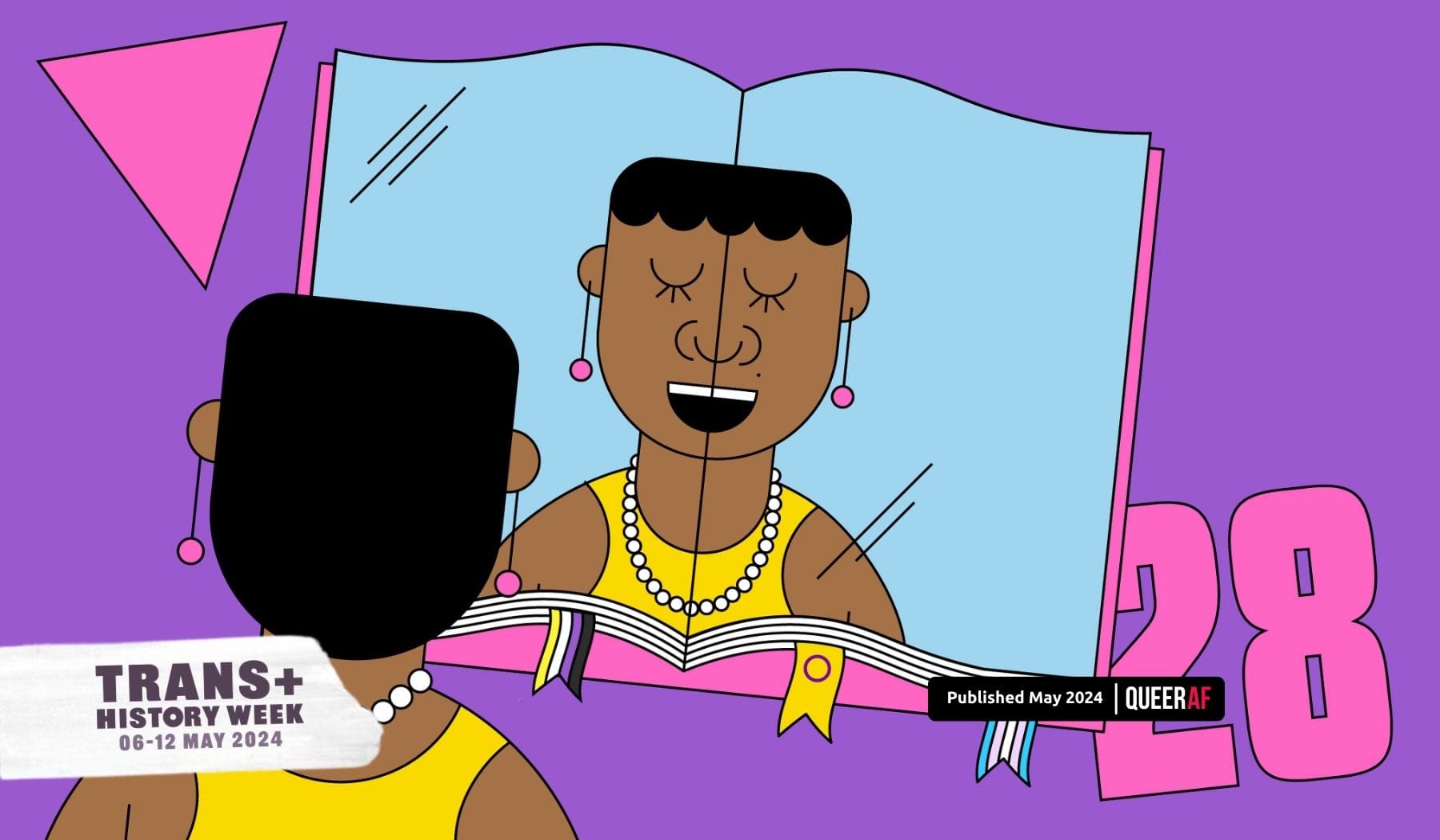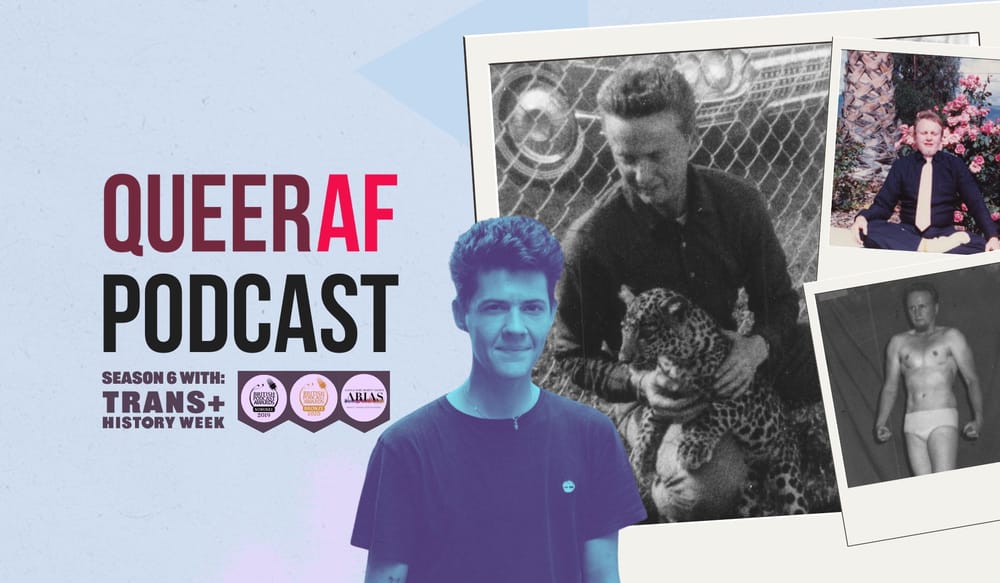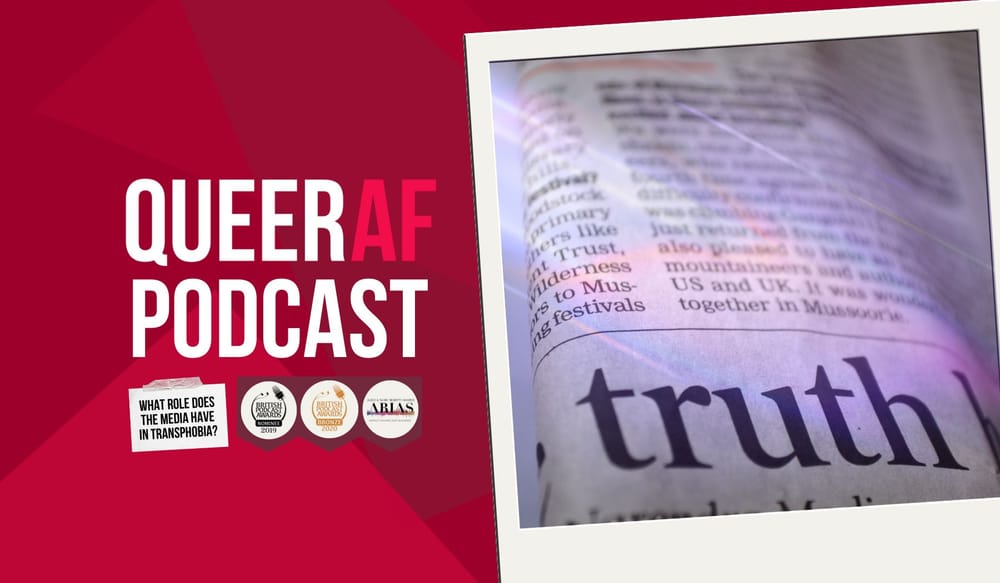
What we learn at school about our bodies, lives and relationships sticks with us. So much of this knowledge has been denied to us growing up, thanks acts like Section 28. So what can we learn from the way sex-education has changed over the last few decades in the UK? This article was produced as official content for the first ever Trans+ History Week, one of QueerAF's launchpad projects.
Sex education should prepare young people to navigate the world of relationships and intimacy with resources and information that reflects their experiences. But the reality is that many of us either received extremely poor relationship and sex ed, or none at all.
However, looking back at the history of sex ed in the UK, there are some interesting lessons for us all.
As LGBTQIA+ people, we rarely get to see ourselves in the sex and relationships education we receive - in most cases, it actively ignores us.
In the 2000 RSHE (relationships sex and health education) guidance, LGBTQIA+ identities were described as ‘sensitive matters’ that were ‘inappropriate’ for some ages.
Fast forward to 2020, when the term ‘Trans’ was included in the RSHE guidance for the first time, alongside a requirement for all schools to teach LGBT inclusive RSHE. But by 2023, Trans young people were being described “as an epidemic” by Equalities Minister Kemi Badenoch, who is now spearheading new guidance for schools which could see some trans pupils outed and banned from some toilets.
This flip-flop between exclusion and inclusion has made the role of the sex educator and teacher extremely difficult.
The true context of this is, of course, the longstanding moral panic that surrounds queer identities. Even today, reactionary attitudes make incorporating LGBTQIA+ education into our curriculum a catalyst for pushback.
The AIDS epidemic and the implementation of Section 28, which banned schools and local services from talking about LGBTQIA+ identities, are core parts of this history. The impact of both these episodes in LGBTQIA+ history are as raw today in the discussion around Trans+ youth accessing health care as they have ever been - Paul Baker
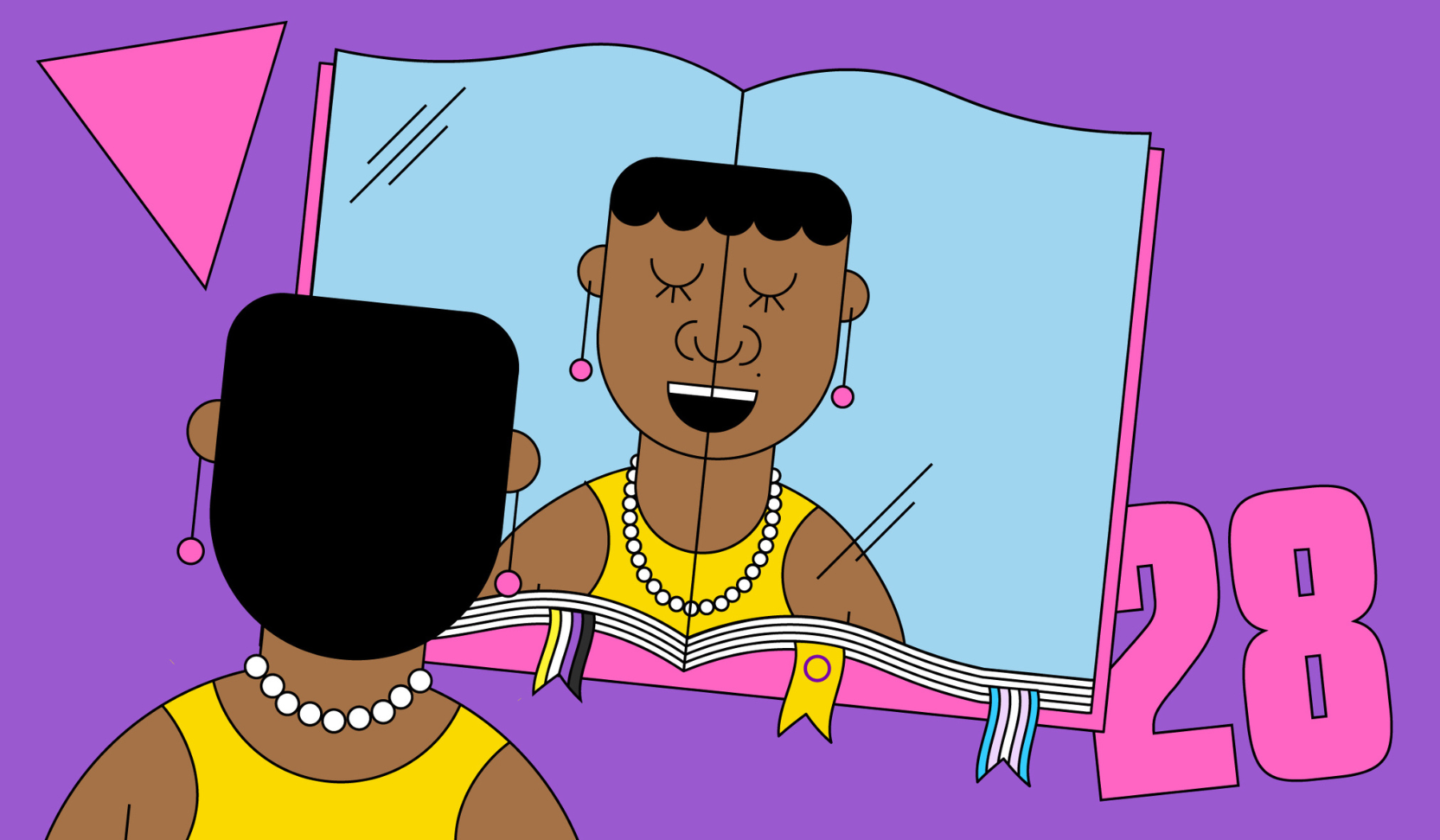
🎨 Artwork description, by Georgey Lee
"This piece conveys the future of sex education in response to Dee Whitnell’s vision: 'Sex edcuation should provide all young people with resources and information that reflects their experiences'"
Lessons from Section 28
Section 28 prohibited the ‘promotion of homosexuality’ by teaching or by publishing material. Brought in during the AIDS pandemic, it had one caveat that this ‘promotion’ was permissible if the teaching was for the purpose of ‘treating or preventing the spread of disease’.
But this term ‘promoting’ is one that caused much debate, both at the time Section 28 was brought in and when it was eventually scrapped. The term ‘promote’ was mentioned dozens of times during the first debate on the bill in February 1988 - Hansard
It’s a term that has continued to plague any debate on LGBTQIA+ representation in education. It is part of a wider narrative, which has seen LGBTQIA+ people be accused of perversion and grooming for centuries - Vox
And it fed the fears that Section 28 was derived from. It was a period when being gay was discussed but not welcomed, or accepted. The panic was heightened by the conservative climate of Thatcher’s Britain, the rise of AIDS and outrage around left-wing policies towards being LGBTQIA+ - Paul Baker
How ‘the children’ would be educated was one of the most topical debates of the ‘80s. On March 25th 1981, a document titled The Practical Curriculum was published. It was the first document to use the term ‘sensitive’ in relation to the teaching of sex education.
Under Section 28, sex education focused on the importance of safer sex, biology, and combating the rise of AIDS. The Education Act of 1993 placed responsibility for the biological aspects of sex education policy in the hands of school governors. The later Teaching and Higher Education Act of 1998 saw government centralising control over what could be imparted in the classroom, though many aspects of sex education, including teaching about HIV and AIDS, came under the science curriculum.
The new curriculum informed teachers that if students asked them for information on contraception or other RSHE topics, that they should be directed to their parents, local GP, or school nurse. If teachers had concerns about children’s ‘morals’ - meaning their sexual activity and/or sexual and gender identity - they were to report it to their headteacher .
The very people who, in some cases, are young people’s only port of call for seeking help on topics such as sexuality and gender identity, were turned against them. Sound familiar? That’s exactly what the 2023 Gender Questioning Guidance does.
At present, with sex education under review, it is clear that we have to prepare for a return to Section 28 by the back door. With Education Secretary Gillian Keegan claiming that schools are hiding sex ed materials from parents - which just isn't the case - and Equalities Minister Kemi Badenoch attending Sex Matters events and publishing guidelines which endanger Trans young people, it’s a scary time.
These political decisions are obviously based on misinformation, but even when proved completely inaccurate their claims feed into the moral panic around Trans+ identities. MPs are using this atmosphere to secure their seats in parliament, because standing against the Trans+ community is trending.
But there is hope.
As LGB+ inclusion has certainly improved, Trans inclusion will follow suit. Though it may be hard to believe, schools are not the enemy. As a former teacher, I can tell you that many teachers and schools want inclusive RSHE. They just don’t have the training required to deliver it yet, or the resources they so badly need from the government.
Teachers reach out to me daily for support. Parents of young Trans people are speaking out, several members of parliament are being vocal in support of Trans youth, and organisations, charities, and campaigns such as my own - Trans Kids Deserve To Grow Up - are fighting to ensure our Trans youth have access to an education that represents them. Other organisations such as Brook and Split Banana are giving young people access to inclusive resources and education in the classroom.
Inclusive sex education isn’t only for Trans+ youth. Parents want inclusive sex ed for all young people and want to work with schools to understand what their children are learning about - TES Magazine
Trans youth are not ‘sensitive matters’. They are not ‘inappropriate’. They deserve access to sex education, and they deserve to see themselves in the materials used in that education.
What do we learn from this history?
Access to inclusive sex education is everything.
Sex education is a human right. And when we learn through a lens that represents and reflects our own experiences, we are better prepared for navigating sex, relationships, sexual health and identity.
Many LGBTQIA+ people never received any sex education which reflected our own experience. As a result, I have seen in my own work within the Sex ed field that LGBTQIA+ folks are more prone to engaging in dangerous sexual activities and relationships, whilst also having no support or sexual health access.
This isolation and erasure of LGBTQIA+ folks in sex education is a death sentence for many LGBTQIA+ people. At the same time it solidifies to those outside of the community that LGBTQIA+ sex ed isn’t appropriate or necessary.
It is vital that LGBTQIA+ people have access to sex education, resources and news that reflects and represents their experiences and community. The more we discuss LGBTQIA+ sex ed through a lens of acceptance and celebration, the more empowered we leave our community.
We deserve sex education that we see ourselves in.
